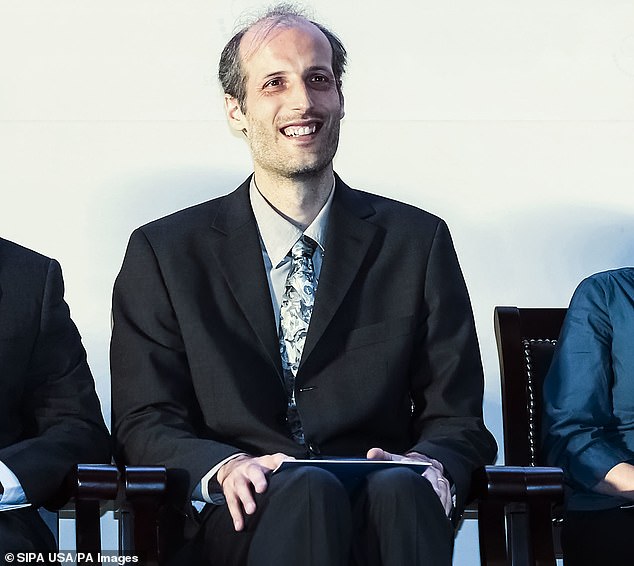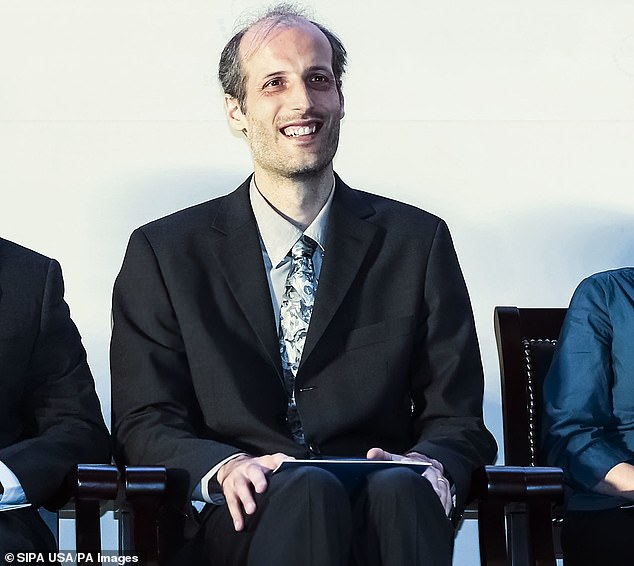British genius wins £2.3m prize for working out the maths involved in stirring a cup of tea with work so clever that ‘it must have been sent to him by aliens’
- Martin Hairer, from Imperial College London, won Breakthrough prize for maths
- The Austrian-British researcher, 44, had been working on his stochastic analysis
- The field saw him delve into how random effects turn the maths of normal things
- He created a complicated 180-page treatise on the idea of ‘regularity structures’
- It left his rivals stunned and one claims he must have got it from intelligent aliens
A maths genius has won a £2.3million prize from Mark Zuckerberg’s foundation for working out the complex equations that result from stirring a cup of tea.
Martin Hairer, 44, from Imperial College London, hit the jackpot as winner of the 2021 Breakthrough prize for mathematics.
The Austrian-British researcher, who lives in London with his mathematician wife Xue-Mei Li, had been working on stochastic analysis.
The field, based on Ito’s calculus, saw him delve into how random effects turn the maths of things such as stirring a cup of tea or the growth of a forest fire.
He created a complicated 180-page treatise on the idea of ‘regularity structures’, which left rivals stunned and saw one say he must have got it from intelligent aliens.
Mr Hairer got the results for the 2021 Breakthrough prize for mathematics – created by Zuckerberg and Israeli-Russian investor Yuri Milner – on Skype during lockdown.

Martin Hairer (pictured in 2014), 44, from Imperial College London, hit the jackpot as winner of the 2021 Breakthrough prize for mathematics

The maths genius won the £2.3million prize from Mark Zuckerberg’s foundation for working out the complex equations that result from stirring a cup of tea (file photo)
He told the Guardian: ‘It was completely unexpected. I didn’t think about it at all, so it was a complete shock. We couldn’t go out or anything, so we celebrated at home.’
The genius was born and raised in Geneva, Switzerland, where his advanced intellect was quickly discovered.
In a school science event he created a software which became Amadeus, know as ‘the Swiss army knife of sound editing’, which is widely used in the music industry.
Mr Hairer studied mathematics at Geneva University before doing a master’s and PhD in physics.
But he moved back into maths when he realised work in theoretical physics can quickly be written off and forgotten.
He said: ‘I wouldn’t really want to put my name to a result that could be superseded by something else three years later.
‘In mathematics, if you obtain a result then that is it. It’s the universality of mathematics, you discover absolute truths.’

The Austrian-British researcher, who lives in London with his mathematician wife Xue-Mei Li (pictured), had been working on stochastic analysis
Mr Hairer’s speciality is stochastic partial differential equations, which looks at how random acts turn normal things into chaos.
This can be on the movement of air in a wind tunnel or how a drop of water seeps across a tissue when it hits it.
But when the random act is very strong, solving the equation can become extremely difficult.
Mr Hairer’s creation of regularity structures, published in 2014, made it possible to tame the random act and reframe it, allowing him to solve the equations.
The mathematician is looking to buy a house in London when the prize money goes in his account.
Advertisement

Devoted web advocate. Bacon scholar. Internet lover. Passionate twitteraholic. Unable to type with boxing gloves on. Lifelong beer fanatic.





